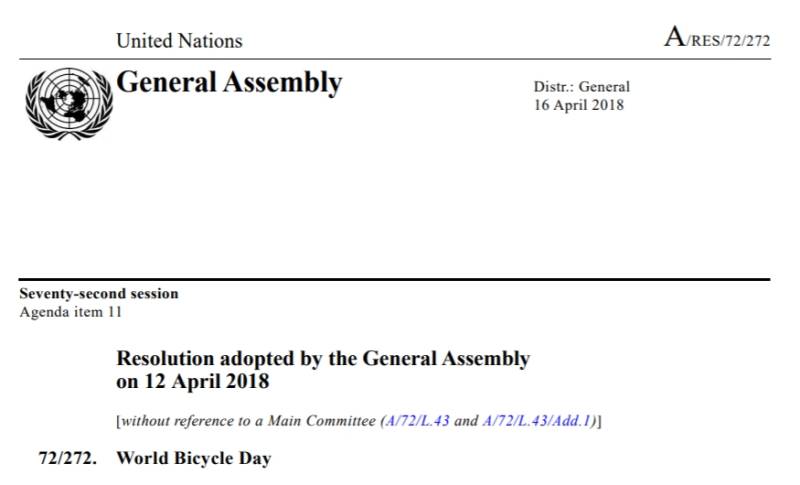Dia Mundial da bicicleta (ONU)
Tipo de publicação
Legislação
Tipo de autoria
Outra
Nº e ano da Lei
Resolução 72/272 / 2018
Nome do autor
ONU
Língua
Inglês
Abrangência geográfica
Internacional/Mundial
Palavra chave 1
Dia do Ciclista
Palavra chave 2
Dia Mundial da Bicicleta
Palavra chave 3
EDUCAÇÃO PARA O TRÂNSITO
Palavra chave 4
Políticas Públicas
Descrição
United Nations General Assembly
Seventy-second session – Agenda item 11
Resolution adopted by the General Assembly on 12 April 2018
[without reference to a Main Committee (A/72/L.43 and A/72/L.43/Add.1)]
72/272. World Bicycle Day
The General Assembly,
Recognizing the contribution of sport to the realization of the Millennium Development Goals, as declared in its resolutions 60/1 of 16 September 2005 and 65/1 of 22 September 2010,
Recalling that, in the 2030 Agenda for Sustainable Development, 1 inter alia, sport was recognized as an important enabler of sustainable development,
Recognizing the need to strengthen and further coordinate efforts, including multi-stakeholder partnerships, at all levels to maximize the potential of the bicycle to contribute to the achievement of the internationally agreed development goals, including the Sustainable Development Goals and targets of the 2030 Agenda, and a culture of peace,
Reaffirming its resolutions 53/199 of 15 December 1998 and 61/185 of 20 December 2006 on the proclamation of international years, and Economic and Social Council resolution 1980/67 of 25 July 1980 on international years and anniversaries, in particular paragraphs 1 to 10 of the annex thereto on the agreed criteria for the proclamation of international years, as well as paragraphs 13 and 14, in which it is stated that an international day or year should not be proclaimed before the basic arrangements for its organization and financing have been made,
Recalling the New Urban Agenda, adopted at the United Nations Conference on Housing and Sustainable Urban Development (Habitat III), held in Quito from 17 to 20 October 2016,2
Acknowledging the uniqueness, longevity and versatility of the bicycle, which has been in use for two centuries, and that it is a simple, affordable, reliable, clean and environmentally fit sustainable means of transportation, fostering environmental stewardship and health,
Recognizing that the synergy between the bicycle and the user fosters creativity and social engagement and gives the user an immediate awareness of the local environment, and recognizing also that the bicycle can serve as a tool for development and as a means not just of transportation but also of access to education, health care and sport,
Emphasizing that the bicycle is a symbol of sustainable transportation and conveys a positive message to foster sustainable consumption and production, and has a positive impact on climate,
Acknowledging the role of the United Nations system and its country programmes in supporting Member States, upon request, in promoting social development through sport and physical education, including cycling,
Emphasizing the extremely important role of productive public-private partnerships in financing programmes for organizing bicycle rallies to promote peace and development, preservation of the environment, institutional development and physical and social infrastructure,
Noting that major international and local cycling competitions should be organized in the spirit of peace, mutual understanding, friendship, tolerance and inadmissibility of discrimination of any kind and that the unifying and conciliative nature of such events should be respected,
- Decides to declare 3 June World Bicycle Day;
- Invites all Member States, organizations of the United Nations system and other relevant international organizations, international, regional and national sports organizations, civil society, including non-governmental organizations and the private sector, and all other relevant stakeholders to cooperate in observing World Bicycle Day, to celebrate the Day and to promote awareness of it;
- Encourages Member States to devote particular attention to the bicycle in cross-cutting development strategies and to include the bicycle in international, regional, national and subnational development policies and programmes, as appropriate;
- Also encourages Member States to improve road safety and integrate it into sustainable mobility and transport infrastructure planning and design, in particular through policies and measures to actively protect and promote pedestrian safety and cycling mobility, with a view to broader health outcomes, particularly the prevention of injuries and non-communicable diseases;
- Encourages stakeholders to emphasize and advance the use of the bicycle as a means of fostering sustainable development, strengthening education, including physical education, for children and young people, promoting health, preventing disease, promoting tolerance, mutual understanding and respect and facilitating social inclusion and a culture of peace;
- Encourages Member States to adopt best practices and means to promote the bicycle among all members of society, and in this regard welcomes initiatives to organize bicycle rides at the national and local levels as a means of strengthening physical and mental health and well-being and developing a culture of cycling in society;
- Requests the Secretary-General to bring the present resolution to the attention of Member States and the organizations of the United Nations system;
- Stresses that the cost of all activities that may arise from the implementation of the present resolution should be met from voluntary
82nd plenary meeting
12 April 2018
1 Resolution 70/1.
2 Resolution 71/256, annex.
18-05867
3/3
<<< BAIXE EM ESPANHOL >>



 Ao navegar no Observatório da Bicicleta você concorda com os
Ao navegar no Observatório da Bicicleta você concorda com os